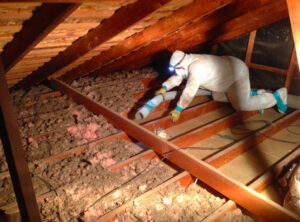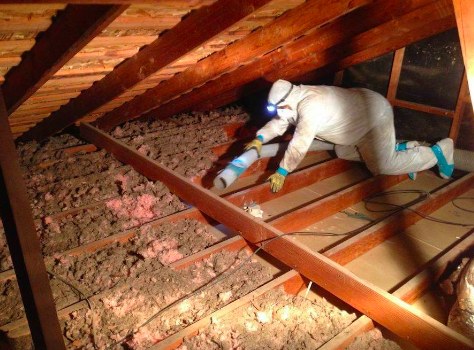Perth Insulation Remover removes existing insulation from an attic or wall cavity before installing new, higher-grade insulation. This improves energy efficiency in your home, resulting in reduced utility bills. Spray foam removal can be completed manually or with a machine. The best option is to use a machine, as it reduces the amount of dust that enters your home and makes cleanup much faster.
Insulation is not an area that many homeowners spend a lot of time thinking about, but it can offer significant benefits for both homeowners and property managers. Its role in the comfort, safety and energy efficiency of a home or office cannot be overstated. It helps prevent moisture from damaging a home’s structure, lowering heating and cooling costs, and increasing resale value.
Whether you are replacing old insulation or installing new spray foam in Colorado, the preparation stage of the process is a critical step. Before the work begins, it is important to cover all surfaces in your home that you don’t want covered with insulation dust. Insulation dust can be a serious problem because our houses are not airtight and the cellulose insulation (which is made from recycled newspapers) kicks up with the slightest movement of air. Protecting areas of your house with plastic or even a drop cloth will help you avoid this issue.
When it comes to removing insulation, the preferred method is with a machine that uses a vacuum to suck the materials from the attic. This method is less messy and much faster than the manual removal technique. However, it is still a messy job and you should prepare for that in advance by covering any furniture or other items in the rooms below your attic access point.
Additionally, you should also prepare by wearing a mask and protective clothing, as the spray foam insulation is composed of small particles that can cause lung damage if inhaled for long periods of time.
Removal
The removal stage of the Insulation Remover process involves removing the old insulation and disposing of it properly. This is a difficult task that requires careful preparation and attention to detail. For example, professionals will wear protective gear and take steps to minimize the spread of dust particles. They will also take measures to protect underlying surfaces from damage.
Depending on the type of insulation and its condition, this may involve cutting or scraping to separate it from the attic structure. Once the insulation is removed, it will be bagged and placed in designated disposal containers. This will reduce the amount of dust and other airborne particles that get kicked up during the cleanup process and can affect indoor air quality.
Insulation is a key component of home energy efficiency and can improve indoor comfort while reducing utility costs. However, over time, this material can become damaged and need to be replaced. Damaged insulation is a major cause of water leaks in homes, which can result in costly repairs and diminished air quality.
Spray foam insulation is a popular choice to replace existing home insulation, as it offers superior energy efficiency and can reduce air leaks. It is important to choose a qualified professional to perform the installation, as improper techniques can lead to health hazards, structural damage, and other problems.
Before beginning the spray foam insulation removal process, it is important to prepare the area and ensure safety. Covering adjacent areas with plastic sheets can prevent contamination of other rooms and surfaces. This will protect them from fiberglass particles, which can cause damage if they come into contact with sensitive materials. It is also a good idea to shut off the power and disconnect any utilities in the area where you are working to avoid injury or damage from electrical or plumbing issues.
As you prepare for the installation, make sure to clear the space by removing furniture and other items that may interfere with access to the attic or crawlspace. It is also a good idea to cover any features in the room, such as door frames or skirting boards, with plastic sheeting to protect them from adhesives or insulation materials. It is also essential to follow local regulations for the proper disposal of hazardous or construction waste.
Disposal
When you’re finished removing insulation from your attic, it’s important to properly dispose of it. The last thing you want is for the fiberglass particles to float throughout your home, posing a health risk to your family members and pets. The simplest way to prevent this from happening is by placing the old insulation in plastic bags or containers, and sealing them tightly. This will help to contain the fiberglass, and it will also make it easier to transport them for disposal later on.
During the disposal stage, it’s important to avoid shaking or disturbing the insulation bags or containers to minimize any possible release of particles. This is important because releasing the fiberglass particles can pose a health risk, especially to children and pets. Once the bags are sealed, they should be disposed of according to local regulations for hazardous and construction waste. Additionally, it’s important to thoroughly wash your hands and any other clothing that may have come into contact with the insulation during removal.
If your attic insulation is contaminated with asbestos, lead paint, or other dangerous materials, it’s essential to hire a specialist to handle the removal and disposal process. These specialists will use the proper equipment and safety gear to ensure that the insulation is safely removed, contained, and discarded without spreading harmful materials to other parts of your home.
In most cases, contaminated insulation can’t be recycled and will require professional disposal. It’s best to consult with your local waste management authority to learn more about the best options for recycling or disposal of your old insulation.
Cleanup
Insulation is important to the overall comfort of your home. It helps keep your house more energy efficient, lowers your heating and cooling costs, and increases the resale value of your home.
It is also a critical component in the protection of your attic from rodent infestation and water damage. However, over time, insulation can become damaged and even lose its insulating capability. It is important to inspect your attic and crawlspace on a regular basis and replace old insulation as needed. The process of removing and replacing old insulation is quick and easy with the help of an insulation remover.
In order to properly perform the insulation removal process, it is important to take safety precautions and wear proper equipment. This includes a dust mask, protective eyewear and gloves. The process can produce a lot of airborne particles and can cause respiratory problems.
You will also need to clear the work area of obstacles and debris that could interfere with the insulator. Lastly, you will need to set up the insulation removal vacuum according to the manufacturer’s instructions. This may include connecting hoses, attaching recovery bags and ensuring all components are securely in place. Once the equipment is ready, you can begin the process of sucking up the old insulation and placing it in waste bags. It is important to take breaks and regularly empty the waste bags.
Once the insulation is removed, you will need to sweep and vacuum any remaining debris or dirt from the floor of your attic. During this process, it is important to take care of any rodent droppings. You will also need to sanitize the space and deodorize if necessary.
This step will help to prevent fungus and bacteria from growing in your attic and crawlspace. Once you have sanitized the area, you can install new insulation and enjoy your home’s improved comfort and efficiency.
Using an insulation remover to remove and replace your old attic insulation is an affordable way to improve the energy efficiency of your home. It will save you money on your heating and cooling bills while reducing your risk of rodent infestations and water damage. In addition, it will increase the resale value of your property and make it more attractive to potential buyers.

